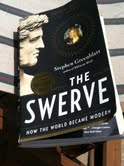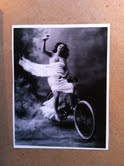I’m hoping a large gothic font will translate into Wordpress because I want it as emblem, as in “This last chemo struck me like the Wrath of God.” It took five days for my body to register the ghastly conclusive blast, but register it did—stomach and entire digestive system screaming “enough, enough.” Fatigue flattened me on the couch, my entire body aching. Each day since then I’ve climbed one foothold up the cliff toward repair, but I can see it’s going to take a long time this time.
 This wickedness was much improved by the arrival in my mailbox on Monday and Tuesday of an avalanche of cards from my Delaware writer-friends. Apparently a bunch of them got together and plotted this. There were cards, books, handmade books, long letters—all manner of love. I was truly back in Delaware. I’m thinking we never “move.” We carry within us our Delaware, our Michigan, our past and present. It’s always present.
This wickedness was much improved by the arrival in my mailbox on Monday and Tuesday of an avalanche of cards from my Delaware writer-friends. Apparently a bunch of them got together and plotted this. There were cards, books, handmade books, long letters—all manner of love. I was truly back in Delaware. I’m thinking we never “move.” We carry within us our Delaware, our Michigan, our past and present. It’s always present.
Before the W O G struck, we had one lovely day at the lake. Things are ready for the arrival of sisters, children, grandchildren. Hammock’s up, screens up, dock has a coat of sealer, cottages cleaned, although not as well as in past years.
I read a lot while Jerry did stuff, which I have to say he loves to do. The book I’m reading here is The Swerve: How the World Became Modern, by Stephen Greenblatt. It won the Pulitzer and the National Book Award in 2011. I’ve underlined all over, which tells you how much it interested me. It relates to cancer and other wickedness, as I’ll explain.
 It’s the story of Epicurus’s (341-270 BC) vision of the world, how it was made available through the brilliant poem, On the Nature of Things, by his devotee Lucretius (1 BC), how the dominance of the Christians in Rome under Constantine (and later) destroyed the vast libraries and knowledge gained by the state’s generous support of research and scholarship, so that for at least 1450 years, Lucretius was pretty much lost, until an Italian classicist-humanist named Poggio Bracciolini found a copy in a monastery in Germany, and made more copies. Gradually, what had been lost began to filter into the discourse of the time, fueling the Renaissance.
It’s the story of Epicurus’s (341-270 BC) vision of the world, how it was made available through the brilliant poem, On the Nature of Things, by his devotee Lucretius (1 BC), how the dominance of the Christians in Rome under Constantine (and later) destroyed the vast libraries and knowledge gained by the state’s generous support of research and scholarship, so that for at least 1450 years, Lucretius was pretty much lost, until an Italian classicist-humanist named Poggio Bracciolini found a copy in a monastery in Germany, and made more copies. Gradually, what had been lost began to filter into the discourse of the time, fueling the Renaissance.
We can’t just blame the Christians. A way of life was dying. So much money was being spent on foreign wars that people were poorer, less apt to care about philosophy or aesthetics. Sound familiar? Later, ignorance was so pervasive, the best minds were burned at the stake.
I tried to condense the book into one paragraph. What matters, though, is WHAT was lost. Basically, it was the valuing of reason. Okay, there was a lot for Christians to dislike in what he said: no soul, no afterlife, humans are not unique, religious are inevitably cruel, life is a primitive battle for survival.
What was enticing in it? He described things as being composed of atoms. Things evolve to follow function. Everything comes into being as a result of a swerve. All particles would follow a straight course if at unpredictable times and places they didn’t deflect slightly, no more than a shift of movement. 
But the main point: the highest goal of human life is the enhancement of pleasure and the reduction of pain. There were the Christians, flogging themselves and wearing hairshirts to get into heaven, and here was THIS. Listen to this one paragraph:
The greatest obstacle to pleasure is not pain; it is delusion. The principle enemies of human happiness are inordinate desire—the fantasy of attaining something that exceeds what the finite mortal world allows—and gnawing fear. Even the dreaded plague, in Lucretius’ account—and his work ends with a graphic account. . . .is most horrible not only for the suffering and death that it brings but also and still more for the “perturbation and panic” that it triggers.
Lucretius thought people are unhappy because they make the mistake of confusing the natural joy of ordinary life with a frenzied craving to possess, to penetrate and consume, what is in reality a dream.
So even the horrors of the Black Plague—and my own particular brand of swerve and its concomitant chemo-horrors—are not horrible so much for themselves as for what flights of the imagination do with them. If we live within the ordinariness of the life we have, Lucretius says, if we look squarely and calmly at the true nature of things, deep wonder is awakened. Life, even in pain and trouble, can be full of happiness.
I’m wondering how much access Epicurus had to Buddhist texts, or if things arrive in the human mind collectively, without contact with others. . . . .
Then when I couldn’t concentrate enough for this kind of reading, I read Tom Franklin’s Crooked Letter, Crooked Letter, a heckova good mystery that combines vivid characterization with a beautifully constructed plot. Franklin, by the way, is married to the poet Beth Ann Fennelly.
I’m feeling encouraged today. There are those flashes of health/optimism that seem to arrive simultaneously in the consciousness. Small flashes get me by for now.


